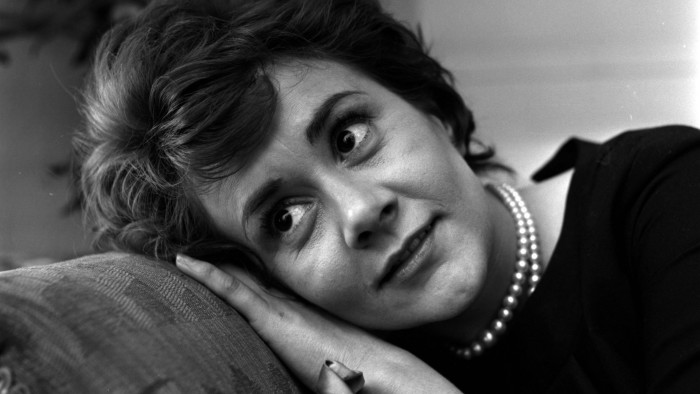Summarize this content to 2000 words in 6 paragraphs in Arabic Unlock the Editor’s Digest for freeRoula Khalaf, Editor of the FT, selects her favourite stories in this weekly newsletter.At the opening night of a new play at London’s Royal Court last Friday, the theatre’s artistic director David Byrne unexpectedly addressed the packed bar. Before the curtain went up, he wanted to pay tribute to Dame Joan Plowright, whose death at the age of 95 had just been announced. She was not only one of the greatest actors of the 20th century, he went on, but also a pioneer of contemporary drama, “a revolutionary force of British theatre”.As a founding member of the English Stage Company at the Royal Court, the theatre’s honorary president, and the wife of Laurence Olivier, first director of the National Theatre, Plowright played a key role in the transformation of UK theatre in the mid-20th century. “As long as there are actors on our stage and contemporary plays in our programme, her influence will always be with us,” said Byrne.Born in Brigg, Lincolnshire, in 1929, Plowright attended Scunthorpe grammar school, Laban Art of Movement Studio in Manchester and the Old Vic Theatre School in London, where rigorous training helped formulate her approach to theatre. She appeared in Orson Welles’s radical 1955 staging of Moby-Dick, but it was as Beatie in Arnold Wesker’s 1959 Roots at the Royal Court — part of the new wave of contemporary writing sweeping through theatre — that she really made her name.A young, working-class woman finding her voice, Beatie was a pivotal character, her blazing final speech expressing the longings and frustrations of many of her generation. It marked out the qualities that Plowright often brought to a role: a combination of emotional truth, earthiness and alacrity of spirit.That role mirrored what arriving at the Royal Court theatre meant for Plowright. She wrote in her 2001 memoir, And That’s Not All, about her joy in finding a group of people who cared about “creating a theatre which was to do with the 20th century. I found my own voice as an actress, and an exhilarating sense of purpose.”Her performances also struck Olivier, and the two worked together in John Osborne’s The Entertainer in 1957. They married in 1961 (Plowright had previously been married to actor Roger Gage, Olivier to Vivien Leigh), and when Olivier was appointed director of the new National Theatre in 1962, Plowright became an integral part of that flagship institution.Their marriage brought together the theatrical establishment and the newly invigorated theatre of the younger generation. It was Plowright who persuaded Olivier to bring in outspoken critic Kenneth Tynan as literary manager. She played Sonya in the production of Chekhov’s Uncle Vanya that formed part of the National Theatre’s inaugural season, giving a heartbreaking performance charged with grace and resilience.In the same season, she delivered the impassioned lead role in Saint Joan. At the theatre’s 50th birthday celebrations in 2013, she reprised a speech from George Bernard Shaw’s play, bringing to an empty stage all the fire, clarity and determination of the young woman facing down her tormentors.She went on to give many great performances in the classics at the National — Maggie in Hobson’s Choice, Masha in Three Sisters, Portia in The Merchant of Venice, Martha in Who’s Afraid of Virginia Woolf? — and across the theatre spectrum, including at the Chichester Festival Theatre, in the West End, and with Lindsay Anderson’s Lyric Theatre company. In 1986 she played Poncia in Núria Espert’s award-winning staging of Lorca’s The House of Bernarda Alba, and the year after Olivier’s death in 1989, she appeared at the Old Vic with her daughters Tamsin and Julie-Kate in a production of JB Priestley’s Time and the Conways, directed by her son, Richard. She worked often with director Franco Zeffirelli, both onstage and on screen, starring alongside Judi Dench, Cher and the late Maggie Smith in his 1999 film Tea with Mussolini, part of a late-flourishing film career.Problems with her eyesight led Plowright to retire from acting in 2014, but it was a career studded with rich, deep, subtle performances. In 2004 she was made a dame. She joked about the complication of having two titles in Roger Michell’s wonderful 2018 documentary Nothing Like a Dame, in which she and her near-contemporaries Smith, Dench and Eileen Atkins congregated at Plowright’s Sussex home.Recalling working with her, actress Sheila Reid talked of her impish sense of humour and her emotional honesty as an artist. And, as Byrne reminded the audience standing in the bar last Friday, the work she did and the immediacy she brought to it “immeasurably shaped the past 70 years of theatre”.
rewrite this title in Arabic Joan Plowright — a revolutionary force in British theatre
مقالات ذات صلة
مال واعمال
مواضيع رائجة
النشرة البريدية
اشترك للحصول على اخر الأخبار لحظة بلحظة الى بريدك الإلكتروني.
© 2025 جلوب تايم لاين. جميع الحقوق محفوظة.




